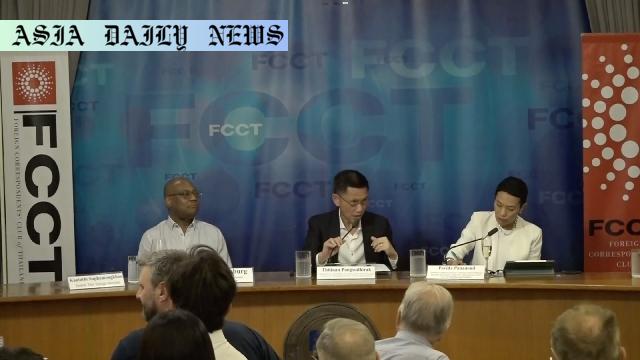Experts discuss the implications of ‘America-first’ policies on Southeast Asia.
A Bangkok forum explored Trump’s potential policy impacts on Southeast Asia.
‘America-first’ approach raises trade and security concerns for the region.
Panel urged revisiting trade deals and enhancing economic resilience.

Experts Convene in Bangkok to Discuss Trump Administration
A forum was held in Bangkok on Monday to evaluate the potential ramifications of Donald Trump’s presidency, specifically his ‘America-first’ stance, on Southeast Asia. The panel included an esteemed group of experts such as professors from leading universities, a journalist, and Thailand’s former foreign minister. The discussion took place just hours before Trump was officially sworn in as the President of the United States.
Impact of ‘America-First’ Policies
Donald Trump’s administration has been marked by its strong focus on protectionism and mercantilism, a point highlighted by Thitinan Pongsudhirak, Visiting Professor at the London School of Economics. Southeast Asian countries, including Vietnam and Thailand, have experienced significant trade surpluses with the US in recent years, positioning them squarely in the spotlight of this policy shift. Experts at the forum cautioned that countries in the region might be forced to renegotiate existing trade deals to align more closely with American interests, potentially impacting economic stability.
Geopolitical and Security Implications
Alongside economic concerns, security challenges under Trump’s leadership have also come to the forefront. Professor Pavida Pananond of Thammasat Business School pointed out the increasing geopolitical tensions that make it necessary for Southeast Asian nations to strengthen their positions in the global supply chain. By doing so, these countries could enhance both their economic resilience and national security in an unpredictable global environment.
Responding to the Challenge
Professor Pavida emphasized the importance of reviewing economic strategies and policies to prepare for ‘Trump 2.0.’ Countries in the region must recalibrate their corporate strategies and find ways to remain essential players in the global economy. This involves fostering domestic innovation, diversifying trade partnerships, and improving competitiveness within the global supply chain.
Regional Impact
The forum also touched upon how the power dynamics in Southeast Asia might shift under these new policies. While countries like Vietnam may focus on bolstering regional trade agreements such as the Comprehensive and Progressive Agreement for Trans-Pacific Partnership (CPTPP), Thailand and other nations could look toward China for increased economic collaborations. The Trump administration’s approach may also offer opportunities for ASEAN nations to enhance intra-regional trade while pursuing alternative global alliances.
The Road Ahead
In conclusion, the panelists underscored the need for proactive measures at all levels—governmental and corporate—to mitigate the potential fallout of Trump’s policies. While the challenges are significant, they also present an opportunity for Southeast Asia to reimagine its global role, encourage innovation, and enhance collaborative engagements across the globe. As the world adjusts to the US’s ‘America-first’ policies, the region’s ability to adapt and thrive will set an example for other developing economies.



Commentary
Understanding the Shift in American Policies
The Trump administration’s ‘America-first’ approach calls for a reevaluation of global trade dynamics, especially for regions like Southeast Asia. This policy has ripple effects that touch trade agreements, economic ties, and even security pacts. The forum held in Bangkok rightfully highlighted these pressing concerns, offering a platform for dialogue and discussion.
Opportunities amidst Challenges
While the outlook may seem daunting, there are opportunities for countries to adapt and thrive. By focusing on becoming indispensable in the global supply chain, nations like Thailand and Vietnam can strengthen their economic positions. However, this requires strategic planning, investment in innovation, and government policies that prioritize long-term resilience over short-term gains.
Collaboration is Essential
As Trump’s policies reshape the global landscape, collaboration within Southeast Asia and with alternative global partners will become critical. ASEAN nations have the capacity to form a strong front, not just to weather the economic storm but to create a more robust regional economy. This collaboration, alongside diversifying trade relationships, could counteract the pressures of renegotiating terms with the US.
In conclusion, while Trump’s policies undoubtedly pose challenges, they also provide a unique opportunity for Southeast Asia to redefine its role within the global economy. Through strategic planning and regional unity, the region can emerge stronger, more resilient, and better prepared for future disruptions.